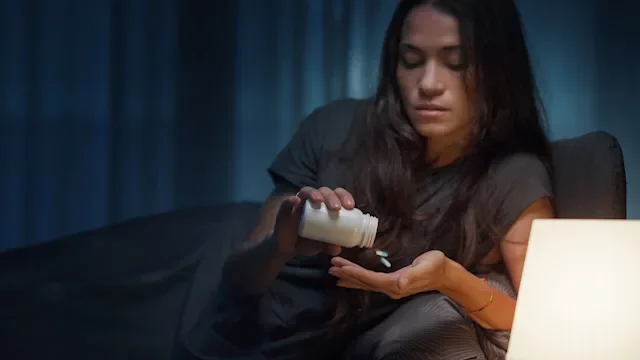Key takeaways:
Your pharmacist can help you brainstorm New Year’s health resolutions for the upcoming year. Staying up to date with vaccines and making informed over-the-counter (OTC) medication choices are a couple examples.
Creating and sharing an updated medication list with your healthcare team is a proactive step to protect your safety. This helps prevent drug interactions.
Take a close look at your medicine drawer. If you no longer need a medication, ask your pharmacist about how to safely dispose of expired or unused medications in your area.
Save on related medications
As the New Year approaches, you may be thinking about resolutions for the upcoming year. Some of your top resolutions may include picking up a new hobby or traveling more. These are worthwhile lifestyle changes; but, adding new health goals to your list should also be a priority.
Doing so may help keep you out of the doctor’s office and prevent medication-related problems down the road, also known as adverse drug events (ADEs). In fact, ADEs cause about 700,000 emergency room visits and 100,000 hospitalizations each year. Avoiding situations like these is beneficial for your health and finances alike.
As medication experts, pharmacists can provide valuable advice to help enhance your health. As you raise your glass for a toast to bring in the New Year, keep in mind some of these possible resolutions from your GoodRx pharmacist.
Search and compare options
1. Stay up to date with your vaccines
With flu, COVID-19, and respiratory syncytial virus (RSV) at our front door, it’s a good time to make sure you and your family are up to date with your vaccines.
Flu cases are popping up in high numbers across the U.S in recent months. As of November 2022, 47 regions were experiencing “high” or “very high” rates of flu activity. Flu vaccines may seem like old news, but they’re still the best way to protect you from catching the flu or developing severe complications from it. Everyone ages 6 months and older should get an annual flu vaccine (with rare exceptions).
To make things easier, you can get your updated COVID booster and flu shot at the same time. People ages 6 months and older are authorized to get an updated COVID booster. As long as it has been at least 2 months since completing your primary series or last booster, you’re good to go.
When it comes to RSV, there currently isn’t a vaccine available yet. But there are some promising RSV vaccines on the horizon.
Other routine vaccines
During the COVID pandemic, many kids have fallen behind on their routine vaccines. Now is a good time to get caught up. Diphtheria, tetanus, and acellular pertussis (DTaP), polio, and varicella (chickenpox) are a few examples of routine vaccines for kids. The human papillomavirus (HPV) vaccine is another important routine vaccination.
It’s also important for adults to stay up to date with routine vaccines. Protection from some vaccines — like tetanus — can fade over time. That’s why it’s important to get a booster every 10 years. Pneumonia and shingles are other examples of possible vaccines to keep up with.
2. Make informed OTC medication choices
While browsing the pharmacy aisles, you’ve likely noticed a variety of over-the-counter (OTC) medications available at your fingertips. From managing a headache to finding relief from cold symptoms, you have many options for self-treatment. However, they’re not without risks. Before starting any new OTC medications, make it a habit to check with your pharmacist or healthcare provider first.
You could also make it a priority to always check the “Drug Facts” label on OTC products before using them. This provides a nice snapshot of important information. Active ingredients, warnings, and dose instructions are a few examples of information listed. This can help you navigate which product is the right fit.
Steering clear of social media challenges with OTC medications is a safe choice, too. One example is a trend that’s encouraging people to cook chicken in NyQuil, a common OTC cold and flu remedy. It’s a dangerous and misleading trend to steer clear of since boiling a medication can enhance its concentration in a dangerous way. Take time this New Year to talk with your family about the dangers of misusing medications, no matter if it's prescription-only or OTC.
3. Make sure everyone on your healthcare team is aware of the medications and supplements you take
Keeping and sharing a current list of all your medications and supplements is a great way to start off the New Year. You can write down a physical list, or you could consider downloading a medication tracking app. This will help your pharmacist check to see if there are any drug interactions to be aware of. And the more medications you take, the more important this is.
Another best practice is to make a list of medication questions to ask your pharmacist. This can be especially helpful if you’re starting a new medication. Questions may include:
What benefits can I expect from this medication?
What side effects should I expect?
Does it interact with any of my other medications and supplements?
Do I need to take it with food?
How often do I take it?
What happens if I forget to take a dose?
Where should I store it?
4. Use trusted online medication resources
Social media is a useful tool to keep up with family and friends. It’s even a handy resource for news and current events. But it can be harmful if we encounter inaccurate information — especially when it comes to health information.
Misinformation (false information) is becoming more and more prevalent. This has been highlighted during the COVID pandemic — contributing in part to the decline in vaccination rates. One study reported that almost 68% of people surveyed were exposed to COVID misinformation while browsing online. Doing your part to combat misinformation could be a priority for the upcoming year to help protect you and your family.
As such, you may be wondering how to find trusted health information online. Here are some reliable websites to keep in mind as go-to resources:
Medical organizations like American Diabetes Association
When searching online, you can also check the author’s information. Pharmacists and healthcare providers should be listed as authors and reviewers for reliable health content. Since health information changes quickly, also check the date to make sure it’s current.
5. Stay on top of your regular health screenings
If you’re behind on health screenings, you’re not alone. According to a CDC study, about 40% of U.S. adults avoided routine medical care during the height of the COVID. Like vaccines, the New Year is an opportune time to get caught up on your health screenings.
You can talk to your healthcare provider about any routine health screenings you may need. But if you want another option, pharmacists that practice in outpatient clinic settings can perform a variety of health screenings too, such as blood pressure, blood glucose (sugar), and cholesterol.
Depending on your health background, here are some examples of other important health screenings:
6. Safely dispose of medications you don’t need
Consider using the New Year as an excuse to clean out your medicine cabinet. If you have any expired or unused medications, there are a variety of options for safe disposal.
The best way to dispose of medications is through take-back locations — many of which are offered at pharmacies. Many chain pharmacy locations have medication drop boxes. You can also search for take-back locations at independent pharmacies through organizations like DisposeMyMeds. The Drug Enforcement Administration also hosts National Take Back Day collection sites throughout the year.
If you can’t get to a medication take-back program, check out the FDA’s flush list. If a medication is listed, you can flush it down the toilet. If it’s not listed, you can throw it in the trash by mixing it with used coffee grounds, dirt, or cat litter. Remember to remove any personal information, such as your name and date of birth.
Medication storage
For medications you still need, storage is an important consideration. It’s best to avoid storing your medications in the bathroom cabinet. The heat and moisture from the shower and sink may damage your medications — causing them to be less effective. A cool, dry space is best for most medications.
To prevent accidental ingestion or abuse, it’s important to keep medications out of reach and locked away from kids, adolescents, and even pets. Keep Poison Control’s phone number 1-800-222-1222 handy in the event of an emergency.
The bottom line
Keep in mind some vaccine- and medication-based New Year’s health resolutions as you bring in the New Year. Your pharmacist can provide a variety of tips for the upcoming year. Staying current with your vaccines, scheduling your routine health screenings, and storing medications safely are a few examples.

Why trust our experts?



References
Agency for Healthcare Research and Quality. (2019). Medication errors and adverse drug events.
Centers for Disease Control and Prevention. (2022). 5 Reasons it is important for adults to get vaccinated.
Centers for Disease Control and Prevention. (2022). Adult immunization schedule.
Centers for Disease Control and Prevention. (2022). Child and adolescent immunization schedule.
Centers for Disease Control and Prevention. (2022). Stay up to date with COVID-19 vaccines including boosters.
Centers for Disease Control and Prevention. (2022). Weekly U.S. influenza surveillance report.
Czeisler, M. E., et al. (2020). Delay or avoidance of medical care because of COVID-19 - related concerns - United States, June 2020. Morbidity and Mortality Weekly Report.
DisposeMyMeds.org. (n.d.). Medication disposal locator.
Dr. Hempel Digital Health Network. (2018). Top 10 mobile apps in medication management.
Lee, J. J., et al. (2020). Associations between COVID-19 misinformation exposure and belief with COVID-19 knowledge and preventive behaviors: Cross-sectional online study. Journal of Medical Internet Research.
MedlinePlus. (2022). Storing your medicines.
National Association of Boards of Pharmacy. (n.d.). Drug disposal.
National Institute on Aging. (2018). Online health information: Is it reliable?
National Institute on Aging. (2022). Taking medicines safely as you age.
U.S. Department of Health and Human Services. (2021). Confronting health misinformation: The U.S. Surgeon General’s advisory on building a healthy information environment.
U.S. Food and Drug Administration. (2015). OTC drug facts label.
U.S. Food and Drug Administration. (2020). Drug disposal: FDA’s flush list for certain medicines.
U.S. Food and Drug Administration. (2021). Where and how to dispose of unused medicines.
U.S. Food and Drug Administration. (2022). A recipe for danger: Social media challenges involving medicines.














